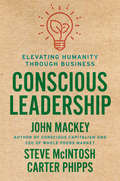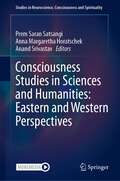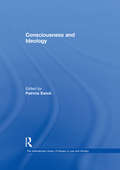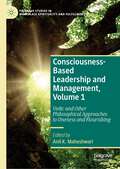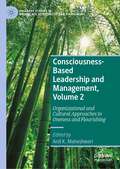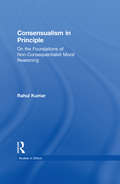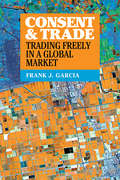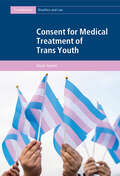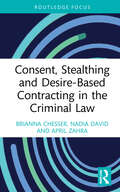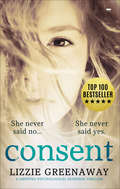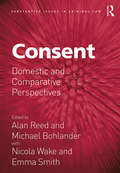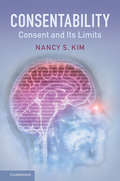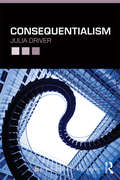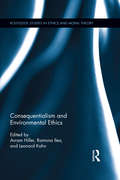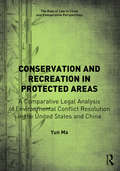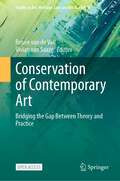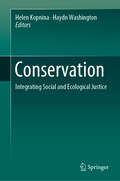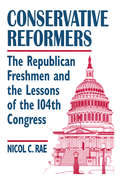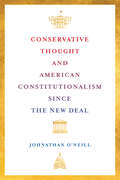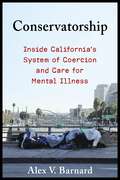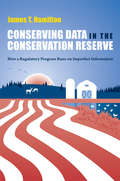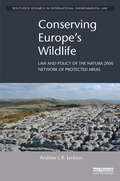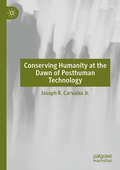- Table View
- List View
Conscious Clay: From Science via Philosophy to Religion
by William Allison ShimerTHE EXCITING “BULL SESSIONS” that so often generate more heat than light, and absorb college students and others in animated arguments far into the night, are nine times out of ten on subjects discussed in these pages. In fact, this book is largely a product of many years of individual and group discussions, as well as of prolonged study in and out of universities of the three essential departments of the modern mind—science, philosophy, and religion.The approach here used is chosen for the scientifically inclined person of today in non-Christian as well as in so-called Christian lands. Jewish and Christian teachers of former periods started by quoting the Bible, but that does not appeal to the skeptical youth of this age. Facts of experience and science must now be the starting point.The arguments employed in these chapters are directed not at the devout religionist but to the troubled and inquiring mind. If this brief but comprehensive analysis of the world, life, ethics, and religion is followed through and its unexpressed implications are thought out and lived out, many will find, I trust, a unifying outlook that will lead not only to happiness, even in tragic misfortune, but to creative living that gives personality survival beyond what we call death. All readers can find interest and profit, I hope, through the adaptation of these ideas to their own experiences, beliefs, and problems, and thus receive some aid in the all-important task of developing their own philosophies of life.”—William Allison Shimer, Preface
Conscious Leadership: Elevating Humanity Through Business
by Carter Phipps John Mackey Steve McintoshFrom Whole Foods CEO John Mackey and his coauthors, a follow-up to groundbreaking bestseller Conscious Capitalism—revealing what it takes to lead a purpose-driven, sustainable business.John Mackey started a movement when he founded Whole Foods, bringing natural, organic food to the masses and not only changing the market, but breaking the mold. Now, for the first time, Conscious Leadership closely explores the vision, virtues, and mindset that have informed Mackey&’s own leadership journey, providing a roadmap for innovative, value-based leadership—in business and in society. Conscious Leadership demystifies strategies that have helped Mackey shepherd Whole Foods through four decades of incredible growth and innovation, including its recent sale to Amazon. Each chapter will challenge you to rethink conventional business wisdom through anecdotes, case studies, profiles of conscious leaders, and innovative techniques for self-development, culminating in an empowering call to action for entrepreneurs and trailblazers—to step up as leaders who see beyond the bottom line.
Consciousness Studies in Sciences and Humanities: Eastern and Western Perspectives (Studies in Neuroscience, Consciousness and Spirituality #8)
by Anand Srivastav Prem Saran Satsangi Anna Margaretha HoratschekThis book presents consciousness models from Eastern and Western perspectives that accommodate current scientific research in the natural sciences and humanities, from neurological experiments through philosophical enquiries to spiritual approaches. It offers up to date research from key disciplines in consciousness studies ranging from neurology, quantum mechanics, algorithmic science, mathematics, and astrophysics to literary studies, philosophy, and (comparative) theology. The volume examines the dichotomy between Western and Eastern perceptions of consciousness – where consciousness is perceived as brain activity by Western scientists, and as a divine presence by various religions, especially in the East. The essays contextualize each other and reciprocally illuminate the potential and limits of the respective approaches. The texts aim at a transdisciplinary and transcultural exchange of ideas in consciousness studies and address a readership from interested lay-readers to experts of the field. The volume is of interest to researchers of consciousness studies.
Consciousness and Ideology (The International Library of Essays in Law and Society)
by Patricia EwickIn this volume of essays by leading socio-legal scholars, the dual concepts of consciousness and ideology are examined and used to expose law’s presence and power in social life. Rejecting the association between ideology and concealment, each essay explores the ways in which ideology and consciousness artfully produce truth, creating both power and the grounds of its resistance. The rich empirical studies included in this volume are crucial to our understanding of law, consciousness and ideology.
Consciousness-Based Leadership and Management, Volume 1: Vedic and Other Philosophical Approaches to Oneness and Flourishing (Palgrave Studies in Workplace Spirituality and Fulfillment)
by Anil K. MaheshwariThis two-volume set examines the need for a consciousness-based view of leadership, which emphasizes universal human flourishing, as opposed to a resource-based view, which focuses on sustaining a competitive advantage. This approach is built around three main principles: 1) Paradigm (Consciousness is primary including complementary existence of opposites), 2) Interpersonal (focusing on empathy and compassion), and 3) Individual (experiencing Oneness and expressing creativity). Volume One is divided into three sections. The first section focuses on Consciousness-based approaches to Inclusive, Purposeful, Quantum, and Vedic leadership. The second section focuses on leadership principles from Vedic scriptures such as Ramayana and Vedanta. The third section includes leadership principles from other scriptures such as Buddhism, Confucianism, Daoism, and Thirukural. Aligning leadership practices with the notion of unbounded consciousness, this edited collection will extend the literature on organizational culture, leadership, and sustainability, contributing to solving the grand challenges facing humanity.
Consciousness-Based Leadership and Management, Volume 2: Organizational and Cultural Approaches to Oneness and Flourishing (Palgrave Studies in Workplace Spirituality and Fulfillment)
by Anil K. MaheshwariThis two-volume set examines the need for a consciousness-based view of leadership, which emphasizes universal human flourishing, as opposed to a resource-based view, which focuses on sustaining a competitive advantage. This approach is built around three main principles: 1) Paradigm (Consciousness is primary, including complementary existence of opposites), 2) Social/Interpersonal (focusing on empathy and compassion), and 3) Individual (experiencing Oneness and expressing creativity).Volume Two is divided into two sections. Each section offers a mix of qualitative and quantitative studies. The first section focuses on consciousness-based development of organizational capabilities such as ambidexterity, flow, and work-life balance. The second section is focused on organizational interventions such as reinvention, meaning-making, well-being, and sustainability. Aligning leadership practices with the notion of an unbounded consciousness, this edited collection will extend literature on organizational culture, leadership, and sustainability, contributing to solving the grand challenges facing humanity.
Consensualism in Principle: On the Foundations of Non-Consequentialist Moral Reasoning (Studies in Ethics)
by Rahul KumarThis book presents and argues for a suitably articulated version of consensualism as a form of Kantian moral theory with an ability to powerfully illuminate the moral intuitions to which Kantian and utilitarian theories have traditionally appealed.
Consent and Trade: Trading Freely in a Global Market
by Frank J. GarciaIn a time of changing trade norms, when free trade seems to be giving way to new kinds of nationalism, some fundamental questions about trade are still not being asked. Is trade consensual or coercive? Is 'free trade' as currently practiced really free? If not, what difference can trade law make in addressing economically oppressive practices that nationalistic trade policies cannot? In this book Garcia offers an examination of trade law's roots in consensual exchange, highlighting the central role of consent in differentiating trade from legally facilitated coercion, exploitation or predation. The book revisits the premise of consensual exchange which underlies the rhetoric of 'free trade', and then examines the social and political conditions that are a necessary part of a more genuine trade law system, in service of the idea that recovering consent in trade law can promote human flourishing on a global scale.
Consent for Medical Treatment of Trans Youth (Cambridge Bioethics and Law)
by Steph JowettAccess to medical treatment for trans youth occupies a haphazard and dynamic legal landscape. In this comprehensive scholarly analysis of the historical and current legal principles, Steph Jowett examines the medico-legal nexus of regulation of this healthcare in Australia and in England and Wales. This is informed by an in-depth discussion of the medical literature on treatment for trans youth, including clinical guidelines, the outcomes of treatment and outcomes for trans youth who are unable to be treated. With illustrative examples and clear language, Jowett argues that legal barriers to clinical practice should be congruent with and reflect the current state of medical knowledge. Not only does Jowett assess the extent to which key legal decisions have been consistent with medical knowledge in the past, but she offers a nuanced, comparative perspective that will inform reform efforts in the future.
Consent, Stealthing and Desire-Based Contracting in the Criminal Law (Routledge Frontiers of Criminal Justice)
by Brianna Jade Chesser Nadia David April ZahraConsent, Stealthing and Desire-Based Contracting in the Criminal Law examines the inconsistencies in the definitions of consent in sexual encounters by examining emerging sex crimes alongside changing community values and the changing legal definitions of consent in sexual offending, focusing on common law and civil law countries. This book distinguishes itself through the use of empirically validated research strategies and an in-depth analysis of current legislative regimes. It argues that desire and pleasure are largely ignored by legal consent definitions, despite its importance in sexuality more broadly. Using two case studies of emerging forms of sexual offending, the criminalisation of sadomasochistic sexual practices and the offence of ‘stealthing’, it examines how the law is both a blunt and under-utilised instrument in the policing of people’s sexual relationships. The presence or absence of consent can change a lawful sexual act between two people into a serious crime with potentially devastating consequences to both survivor and offender. Yet there remains no consistent definition of consent applied within and between legal jurisdictions across the world. A comparative analysis reveals parallels between common law countries and civil law countries. The book also provides a brief history of the use of term consent in relation to sexual offending and examines definitional and sociological requirements of conceptual consent across history. Covering jurisdictions in the US, UK, and Australia, providing an innovative resource on issues relating to consent presented in an accessible way, this book will appeal to students and researchers of criminal justice, criminal law, criminology, sociology and gender studies.
Consent: A Gripping Psychological Suspense Thriller
by Lizzie Greenaway“Wow! . . .a powerful and compelling tale that will get under your skin and have you still thinking about it long after you turn that final page.” —Once Upon a Time Book ReviewsShe never said no . . . she never said yes.Sometimes the men we think we can trust are the ones we really shouldn’t trust at all. When the lines of consent are blurred how do you ever know who is telling the truth? Was it a night of drunken passion or a night of terror?Molly Smith doesn’t know.Jacob Walker-Kent did not attack her. He did not lure her down a dark alleyway. He did not beat her up. She did not scream. She did not fight him off. He walked her home. He was her friend. Or was he?When the courts fail to protect us sometimes there is so much more at risk . . .Consent is a compelling courtroom drama with a shocking twist, a harrowing outcome, that tackles an area of the law where justice sometimes seems impossible.“This one had me on the edge of my seat all the way through! . . . A strong, powerful read delivered with expertise and one I highly recommend, and happily give a full five stars.” —Grace J Reviewerlady“Lizzie Greenaway has shown courage in tackling a complex issue and has done such a great job of bringing this story to life and how she deals with an alleged rape . . . masterfully written and executed perfectly.” —Once Upon a Time Book Reviews
Consent: Domestic and Comparative Perspectives (Substantive Issues in Criminal Law)
by Alan Reed Emma Smith Michael Bohlander Nicola WakeThis volume presents a leading contribution to the substantive arena relating to consent in the criminal law. In broad terms, the ambit of legally valid consent in extant law is contestable and opaque, and reveals significant problems in adoption of consistent approaches to doctrinal and theoretical underpinnings of consent. This book seeks to provide a logical template to focus the debate. The overall concept addresses three specific elements within this arena, embracing an overarching synergy between them. This edifice engages in an examination of UK provisions, with specialist contributions on Irish and Scottish law, and in contrasting these provisions against alternative domestic jurisdictions as well as comparative contributions addressing a particularised research grid for consent. The comparative chapters provide a wider background of how other legal systems' treat a variety of specialised issues relating to consent in the context of the criminal law. The debate in relation to consent principles continues for academics, practitioners and within the criminal justice system. Having expert descriptions of the wider issues surrounding the particular discussion and of other legal systems' approaches serves to stimulate and inform that debate. This collection will be a major source of reference for future discussion.
Consentability: Consent and its Limits
by Nancy S. KimProblems regarding the nature of consent are at the heart of many of today's most pressing issues. For example, the #MeToo movement has underscored the need to move beyond viewing consent as a simple matter of yes or no. Consent is complex because humans and their relationships are complicated. Humans, as a result of cognitive limitations and emotional and physical vulnerabilities, are susceptible to manipulation and mistakes. Given the potential for regret, are there some things to which one should not be permitted to consent? The consentability quandary becomes more urgent with technological advances. Should we allow body hacking? Cryogenics? Consumer travel to Mars? Assisted suicide? In Consentability: Consent and Its Limits, Nancy S. Kim proposes a bold, original framework for evaluating consentability, which considers the complexities surrounding consent.
Consequential Courts
by Diana Kapiszewski Robert A. Kagan Gordon SilversteinIn the early twenty-first century, courts have become versatile actors in the governance of many constitutional democracies, and judges play a variety of roles in politics and policy making. Assembling papers penned by academic specialists on high courts around the world, and presented during a year-long Andrew W. Mellon Foundation John E. Sawyer Seminar at the University of California, Berkeley, this volume maps the roles in governance that courts are undertaking and the ways they have come to matter in the political life of their nations. It offers empirically rich accounts of dramatic judicial actions in the Americas, Europe, the Middle East and Asia, exploring the political conditions and judicial strategies that have fostered those assertions of power and evaluating when and how courts' performance of new roles has been politically consequential. By focusing on the content and consequences of judicial power, the book advances a new agenda for the comparative study of courts.
Consequentialism (New Problems of Philosophy)
by Julia DriverConsequentialism is the view that the rightness or wrongness of actions depend solely on their consequences. It is one of the most influential, and controversial, of all ethical theories. In this book, Julia Driver introduces and critically assesses consequentialism in all its forms. After a brief historical introduction to the problem, Driver examines utilitarianism, and the arguments of its most famous exponents, John Stuart Mill and Jeremy Bentham, and explains the fundamental questions underlying utilitarian theory: what value is to be specified and how it is to be maximized. Driver also discusses indirect forms of consequentialism, the important theories of motive consequentialism and virtue consequentialism, and explains why the distinction between subjective and objective consequentialism is so important. Including helpful features such as a glossary, chapter summaries, and annotated further reading at the end of each chapter, Consequentialism is ideal for students seeking an authoritative and clearly explained survey of this important problem.
Consequentialism and Environmental Ethics: Consequentialism And Environmental Ethics (Routledge Studies in Ethics and Moral Theory)
by Ramona Ilea Avram Hiller Leonard KahnThis volume works to connect issues in environmental ethics with the best work in contemporary normative theory. Environmental issues challenge contemporary ethical theorists to account for topics that traditional ethical theories do not address to any significant extent. This book articulates and evaluates consequentialist responses to that challenge. Contributors provide a thorough and well-rounded analysis of the benefits and limitations of the consequentialist perspective in addressing environmental issues. In particular, the contributors use consequentialist theory to address central questions in environmental ethics, such as questions about what kinds of things have value; about decision-making in light of the long-term, intergenerational nature of environmental issues; and about the role that a state’s being natural should play in ethical deliberation.
Conservation and Recreation in Protected Areas: A Comparative Legal Analysis of Environmental Conflict Resolution in the United States and China (The Rule of Law in China and Comparative Perspectives)
by Yun MaThis book provides a comprehensive and up to date comparative study of the management and resolution of conflicts between conservation and recreation in protected areas in the US and China. Competing claims on the use of nature, increasing regulation of land use and recreational activities, and the conflicting goals between conservation and development have led to a rise in conflicts in the designation and management of protected areas. How to effectively manage and resolve these conflicts has become a challenge for both legislators and managers. By adopting an institutional dimension in legal interpretation, this book critically examines how such conflicts are dealt with in the legal regimes of the US and China while exploring interactions between legislatures, agencies and courts. The book searches for a plausible solution to improve the legal framework of protected areas in China by emulating pertinent mechanisms developed in the US, whilst also presenting legal and policy recommendations to the US. This informative book will be useful for legal scholars in Chinese law, nature conservation law, administrative law and comparative law.
Conservation of Contemporary Art: Bridging the Gap Between Theory and Practice (Studies in Art, Heritage, Law and the Market #9)
by Vivian Van Saaze Renée van de VallThis open access book investigates whether and how theoretical findings and insights in contemporary art conservation can be translated into the daily work practices of conservators or, vice versa, whether and how the problems and dilemmas encountered in conservation practice can inform broader research questions and projects. For several decades now, the conservation of contemporary art has been a dynamic field of research and reflection. Because of contemporary art’s variable constitution, its care and management calls for a fundamental rethinking of the overall research landscape of museums, heritage institutions, private-sector organizations and universities. At first, this research was primarily pursued by conservation professionals working in or with museums and other heritage organizations, but increasingly academic researchers and universities became involved, for instance through collaborative projects. This book is the result of such collaboration. It sets out to bridge the “gap” between theory and practice by investigating conservation practices as a form of reflection and reflection as a form of practice.
Conservation: Integrating Social and Ecological Justice (Routledge Explorations In Environmental Studies)
by Helen Kopnina Haydn WashingtonThis book provides keys to decrypt current political debates on the environment in light of the theories that support them, and provides tools to better understand and manage environmental conflicts and promote environmentally friendly behaviour. As we work towards global sustainability at a time when efforts to conserve biodiversity and combat climate change correspond with land grabs by large corporations, food insecurity, and human displacement. While we seek to reconcile more-than-human relations and responsibilities in the Anthropocene, we also struggle to accommodate social justice and the increasingly global desire for economic development. These and other challenges fundamentally alter the way social scientists relate to communities and the environment. This book takes as its point of departure today’s pressing environmental challenges, particularly the loss of biodiversity, and the role of communities in protected areas conservation. In its chapters, the authors discuss areas of tension between local livelihoods and international conservation efforts, between local communities and wildlife, and finally between traditional ways of living and ‘modernity’. The central premise of this book is while these tensions cannot be easily resolved they can be better understood by considering both social and ecological effects, in equal measure. While environmental problems cannot be seen as purely ecological because they always involve people, who bring to the environmental table their different assumptions about nature and culture, so are social problems connected to environmental constraints. While nonhumans cannot verbally bring anything to this negotiating table, aside from vast material benefits that society relies on, the distinct perspective of this book is that there is a need to consider the role of nonhumans as equally important stakeholders – albeit without a voice. This book develops an argument that human-environmental relationships are set within ecological reality and ecological ethics and rather than being mutually constitutive processes, humans have obligate dependence on nature, not vice versa. This would enable an ethical position encompassing the needs of other species and giving simultaneous (without one being subordinated to another) consideration to justice for humans and non-humans alike. The book is accessible to both social scientists and conservation specialists, and intends to contribute to strengthening interdisciplinary collaborations in the field of conservation.
Conservative Reformers: The Freshman Republicans in the 104th Congress
by Nicol C. RaeNicol Rae's engaging account of the Republican revolutionaries' freshman year in Congress persuasively demonstrates that the precepts set forth by Madison in Federalist 10 and 51 are still in force in our remarkably stable political system. The 73 Republican freshmen who entered the House of Representatives after the 1994 election were a well-organized group with majority status and a commitment to change. This book examines the extent to which they were successful in redirecting policy and reforming the institutions of representative government -- and the extent to which those same institutions moderated, and even frustrated, efforts to introduce radical, rapid -- indeed revolutionary -- change. Contrasts are drawn both with the role of the Republican freshmen in the Senate and with the power of the President as manifested in the 1995-96 budget battle. The book is based on interviews conducted by the author when he was an APSA Congressional Fellow in the offices of Rep. George P. Radanovich, president of the freshman Republican class, and Sen. Thad Cochran, chairman of the Senate Republican Conference.
Conservative Thought and American Constitutionalism since the New Deal
by Johnathan O'NeillAn intellectual history of American conservativism since the New Deal.The New Deal fundamentally changed the institutions of American constitutional government and, in turn, the relationship of Americans to their government. Johnathan O'Neill's Conservative Thought and American Constitutionalism since the New Deal examines how various types of conservative thinkers responded to this significant turning point in the second half of the twentieth century.O'Neill identifies four fundamental transformations engendered by the New Deal: the rise of the administrative state, the erosion of federalism, the ascendance of the modern presidency, and the development of modern judicial review. He then considers how various schools of conservative thought (traditionalists, neoconservatives, libertarians, Straussians) responded to these major changes in American politics and culture. Conservatives frequently argued among themselves, and their responses to the New Deal ranged from adaptation to condemnation to political mobilization. Ultimately, the New Deal pulled American governance and society permanently leftward. Although some of the New Deal's liberal gains have been eroded, a true conservative counterrevolution was never, O'Neill argues, a realistic possibility. He concludes with a plea for conservative thinkers to seriously reconsider the role of Congress—a body that is relatively ignored by conservative intellectuals in favor of the courts and the presidency—in America's constitutional order. Conservative Thought and American Constitutionalism since the New Deal explores the scope and significance of conservative constitutional analysis amid the broader field of American political thought.
Conservatorship: Inside California’s System of Coercion and Care for Mental Illness
by Alex V. BarnardIs involuntary psychiatric treatment the solution to the intertwined crises of untreated mental illness, homelessness, and addiction? In recent years, politicians and advocates have sought to expand the use of conservatorships, a legal tool used to force someone deemed “gravely disabled,” or unable to meet their needs for food, clothing, or shelter as a result of mental illness, to take medication and be placed in a locked facility. At the same time, civil liberties and disability rights groups have seized on cases like that of Britney Spears to argue that conservatorships are inherently abusive.Conservatorship is an incisive and compelling portrait of the functioning—and failings—of California’s conservatorship system. Drawing on hundreds of interviews with professionals, policy makers, families, and conservatees, Alex V. Barnard takes readers to the streets where police encounter homeless people in crisis, the locked wards where people receiving treatment are confined, and the courtrooms where judges decide on conservatorship petitions. As he shows, California’s state government has abdicated authority over this system, leaving the question of who receives compassionate care and who faces coercion dependent on the financial incentives of for-profit facilities, the constraints of underresourced clinicians, and the desperate struggles of families to obtain treatment for their loved ones.This book offers a timely warning: reforms to expand conservatorship will lead to more coercion but little transformative care until government assumes accountability for ensuring the health and dignity of its most vulnerable citizens.
Conserving Data in the Conservation Reserve: How A Regulatory Program Runs on Imperfect Information
by James HamiltonEnrolling over 30 million acres, the U.S. Conservation Reserve Program (CRP) is the largest conservation program in the United States. Under the guidelines of the CRP, the federal government pays farmers to stop farming their land in the hopes of achieving a variety of conservation goals, including the reduction of soil erosion, improvement of water quality, and creation of wildlife habitat. In Conserving Data, James T. Hamilton explores the role of information in the policy cycle as it relates to the CRP. The author asks how the creation and distribution of information about what is going on across these millions of enrolled acres has influenced the development of the program itself. Of the many CRP stakeholders, each accesses a different set of information about the CRP?s operations. Regulators have developed the Environmental Benefits Index as a rough indicator of a field?s conservation benefits and adopted that measure as a way to determine which lands should be granted conservation contracts. NGOs have used publicly available data from these contracts to show how CRP monies are allocated. Members of Congress have used oversight hearings and GAO reports to monitor the Farm Service Agency?s conservation policy decisions. Reporters have localized the impact of the CRP by writing stories about increases in wildlife and hunting on CRP fields in their areas. Conserving Data brings together and analyzes these various streams of information, drawing upon original interviews with regulators, new data from Freedom of Information Act requests, and regulatory filings. Using the CRP as a launch point, Hamilton explores the role of information, including 'hidden information,' in the design and implementation of regulatory policy.
Conserving Europe's Wildlife: Law and Policy of the Natura 2000 Network of Protected Areas (Routledge Research in International Environmental Law)
by Andrew L.R. JacksonThe Natura 2000 network of protected areas is the centrepiece of European Union nature policy, currently covering almost one-fifth of the EU’s entire land territory plus large marine areas. This vast EU-wide network, which aims to conserve Europe’s most valuable and threatened species and habitats, has major impacts on land use throughout all Member States of the EU. This book critically assesses the origins and implementation of the Natura 2000 network, established under the Birds Directive of 1979 and the Habitats Directive of 1992. Based on original archival research and interviews with key participants, the book records a detailed history of the origins and negotiation of Natura 2000 policy and law, with the history of EU environmental policy provided as a framework. An historical institutionalist approach is adopted, which emphasises the importance of understanding legal and policy development as processes that unfold over time. Three phases in the history of EU environmental policy are identified and described, and the history of EU nature policy is placed within the context of these three phases. Informed by this history, the author presents a comprehensive summary and assessment of the law and policy that protects Natura 2000 sites at EU level, and reviews the nature conservation outcomes for the targeted species and habitats. The book reveals how a knowledge of the history of Natura 2000 enriches our understanding of key issues such as conflicts in establishing and conserving the Natura 2000 network, EU integration in the field of nature conservation, and the future of EU nature policy.
Conserving Humanity at the Dawn of Posthuman Technology
by Joseph R. Carvalko Jr.This volume examines the latest scientific and technological developments likely to shape our post-human future. Using a multidisciplinary approach, the author argues that we stand at the precipice of an evolutionary change caused by genetic engineering and anatomically embedded digital and informational technologies. The author delves into current scientific initiatives that will lead to the emergence of super smart individuals with unique creative capacities. He draws on technology, psychology and philosophy to consider humans-as-they-are relative to autonomy, creativity, and their place in a future shared with ‘post humans.’ The author discusses the current state of bioethics and technology law, both which policymakers, beset by a torrent of revolutionary advances in bioengineering, are attempting to steer. Significantly, Carvalko addresses why we must both preserve the narratives that brought us to this moment and continue to express our humanity through, music, art, and literature, to ensure that, as a uniquely creative species, we don’t simply vanish in the ether of an evolution brought about by our own technology.

